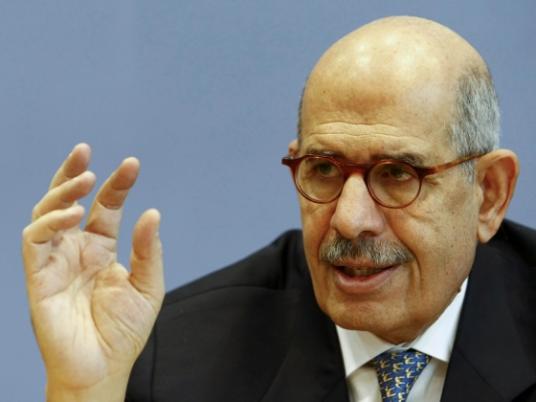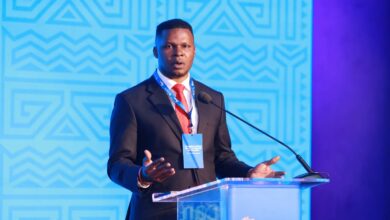It is impossible to truly understand ElBaradei without seeing the man through the eyes of his wife who has spent countless years by his side. This woman, who knows her husband’s dreams and aspirations, what angers and makes him happy, and what he can offer to Egypt, has a unique perspective on ElBaradei.
Al-Masry Al-Youm: I want to ask you as we begin about Mohamed ElBaradei, the person and the husband, that you married out of love?
Aida el-Kashf: ElBaradei and I, always and forever, are friends. We converse constantly to the extent that our children always say “You never tire of speaking.” As a graduate of the faculty of economics and political science, I am interested in what preoccupies him. As a husband, he is extremely compassionate, and he could not be more affectionate with the children. He loves our home very much and is interested in its affairs. He has an artist’s touch when it comes to furnishing the house as he loves to see beauty in his life. He is very accurate, and possesses an amazing memory that I don’t have, such that he is always remembering the smallest details of everything.
Al-Masry: And what about his relationships with friends?
El-Kashf: He’s a quiet and shy person, but when it comes to public matters he’s the exact opposite. He is an amazing judge of character.
Al-Masry: And about the time he spends reflecting?
El-Kashf: He likes to have a lot of personal time in which he listens to music and reads. He doesn’t like to go out a lot, but prefers to sit in the house with his family.
Al-Masry: How did you interact with such a quiet, gentle man while he was locked in battles with the international community?
El-Kashf: His relationship with the family never changed despite him being involved in stressful battles in the international arena. I always seek to understand what is troubling him and not to add to his worries, because I always know what he his feeling and thinking related to his work.
Al-Masry: When does he get angry? And how does he show it?
El-Kashf: He is extremely gentle and patient, although if he gets angry his heart closes. He’s not the type of man who screams or becomes zealous about something, but rather he gets angry like a civilized person, showing patience and restraint.
Al-Masry: What are his habits when it comes to eating?
El-Kashf: He likes very simple, light foods like vegetables, fish and molokhiya. He ate the same things in Vienna when I was with him.
Al-Masry: Does he enjoy cooking?
El-Kashf: He doesn’t have the time for it.
Al-Masry: Was he fastidious about keeping in touch with you while traveling and during the long conferences he would attend?
El-Kashf: Of course. He was always keen to call me several times a day to make sure that I was okay.
Al-Masry: And how did he speak to you about Egypt during the several years he was abroad?
El-Kashf: ElBaradei was away from Egypt for several years but it never left his mind. He would take his yearly vacations here in Egypt, besides the fact that his family was also here. But Egypt also made him sad. He always would remember the Egypt that he loved when he was young. It wore on him to see other countries progress while Egypt was left behind even though Egypt deserved so much more than that.
Al-Masry: How did he first let you know of his desire to do political work in Egypt?
El-Kashf: Everything that has occurred happened in the course of the last month, after he finished his work at the agency and began to call for the political participation of the people. He’s always had it in his mind that whatever he could do for his country, he would do it. He always felt that he was indebted to his country.
Al-Masry: And what was your reaction?
El-Kashf: I told him, “I’m afraid for you.” I was afraid of him entering an arena or battleground that he knew nothing about because nothing is transparent on this battlefield. A person when they enter into some battle usually knows its boundaries and limits. But the situation here is unclear. It’s murky.
Al-Masry: Were you afraid for his personal safety?
El-Kashf: Of course. I was afraid for his life. He told me “Stay calm and don’t be afraid. If we stay afraid, we won’t even leave the house.”
Al-Masry: What is the most beautiful thing about Doctor Mohamed ElBaradei?
El-Kashf: Two main things: the goodness of his heart, and his mind and way of thinking. His thoughts are organized like a file cabinet and his thinking is always logical. And yet despite how logical he is, he is extremely compassionate and sensitive.
Al-Masry: And his weak point?
El-Kashf: Sometimes he is too good of a person. He can be indulgent, but within limits.
Al-Masry: What are his faults?
El-Kashf: That he is so organized and accurate. Sometimes I find that the slightest imperfection in the smallest of details irritates him. I always tell him, “save your irritation for the important things.”
Al-Masry: Do you feel that as he begins to engage in public work in Egypt that he is embarking on a new and different stage in his life?
El-Kashf: Of course it is a time of change. There is a change in terms of the general atmosphere and the rules of the game but at the same time, this is an extension of his profession because he won’t change how he plays the game.
Al-Masry: If the matter were in your hands, what decision would you make for ElBaradei?
El-Kashf: I would be looking forward to retirement with all the calm and tranquility that accompanies that stage in life. The last years in his life have been extremely stressful, and I was hoping that we would now find quiet and repose. Because I knew him I was sure that when he finished his work at the agency he would busy himself with other work because he loves to work. I expected that he would start writing, as I know how much he loves it.
Al-Masry: How many hours does he sleep?
El-Kashf: ElBaradei sleeps according to the circumstances at hand as he constantly has work to do.
Al-Masry: What were the things that he was keen to teach his two children?
El-Kashf: Sincerity and bravery. He always told them to give him their opinions even if they differed from his own, as a person has to learn to be true to himself.
Al-Masry: Does he have a nickname for you?
El-Kashf: Aida and not any other names, and I always call him Mohammed and not anything else.
Al-Masry: And do you ever imagine yourself someday as Egypt’s first lady?
El-Kashf: No, of course not.
Al-Masry: Have you dreamed of that?
El-Kashf: No, of course not.
Al-Masry: Do you see that this is a possibility now?
El-Kashf: I’ve never imagined that.
Al-Masry: If it became so would you see it as a burden or as a different role to play?
El-Kashf: Both, as it is a completely different role.
Al-Masry: Do you want it to happen or not?
El-Kashf: A person accepts what God has willed for them. If it happens then I will expend all of my efforts in that domain.
Al-Masry: And what’s your advice for ElBaradei in your role as his primary political advisor, as you have termed it?
El-Kashf: I don’t interfere to that extent. When he enters the political battleground I will tell him, “be careful, be patient and listen to the people.” I will advise him to continue being brave and candid in telling the truth. It is not so much fear as it is the anticipation of what we cannot predict.
Al-Masry: They say that love dies after marriage?
El-Kashf: (Laughing). Well, this is what people say.
Translated from the Arabic Edition.




